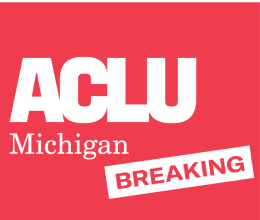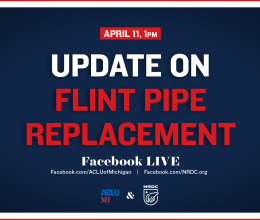Once broken, trust can be almost impossible to repair.
This maxim is more than evident in Flint, where residents were repeatedly given false assurances that their water was safe for 18 months following the disastrous switch in April 2014 to the Flint River as the city’s water source.
Who can blame these same residents for refusing to believe that Gov. Rick Snyder’s administration –the primary culprit in this unthinkable crime committed against a city – now only has the people’s best interests at heart?
The fact that Snyder himself has lawyered up and, according to Congressman Elijah Cummings (D-Md.), successfully stonewalled a House committee investigating the crisis, only fuels further skepticism. The mistrust is so rampant that some of the very people who helped expose the crisis are now viewed by residents with suspicion when these same experts suggest the city’s switch back to Lake Huron and the introduction of proper corrosion control measures are improving the crisis.
Meanwhile, the handling of two events this week hasn’t helped.
At a time when transparency is desperately needed to assure residents that the crisis is being addressed in openly and honestly, experts gathered in Chicago on Tuesday to review the most recent data…behind closed doors.
“There is no valid reason to shut out the public from this meeting,” said Henry Henderson, Midwest program director for the Natural Resources Defense Council, in a Detroit News report. “We’re concerned that the choice to keep these conversations behind closed doors works to simply reinforce the distrust between the community and the government. The Flint Water Crisis is not over until the community trusts their water is safe, and a lack of transparency makes that harder.”
The NRDC and the ACLU of Michigan have filed a lawsuit on behalf of Flint residents to ensure that the government provides bottled water to people who need it, that homes have working filters and that lead service lines throughout the city eventually are replaced.
The activists who were pivotal in exposing the lead contamination of the city’s water supply could have been included in that meeting, but they weren’t. The meeting could have been live-streamed so that anyone could witness the deliberations, but it wasn’t.
Which means that the information coming out of that meeting is shrouded in cloud of suspicion that it is, at best, a filtered version of the truth, sanitized for public consumption.
Something similar occurred at a town hall meeting held in Flint on Wednesday – a meeting originally intended to be by invitation only.
Many of the same experts who had gathered in Chicago the day before were on hand to present their findings and answer questions from the public.
Kind of.
Instead of being allowed to ask questions directly, residents had to write their queries down on cards. Mayor Karen Weaver and Rich Baird of the governor’s office decided which questions actually got asked in the public forum. Weaver assured people that questions that weren’t asked would be posted online and answered in the days to come.
Even so, many felt the forum essentially silenced the voices of Flint residents, both literally and figuratively.
And it’s that kind of censoring that rankles Melissa Mays, one of the key players involved in the effort to expose the crisis and a plaintiff in the ACLU/NRDC lawsuit against the city and the state.
One problem with having someone else asking the questions posed by the public, says Mays, is that “you don’t get to ask follow-up questions to pin them down when they try to tap-dance around telling the truth.”
In other words, the whole affair comes off as stage-managed and opaque rather than providing the kind of transparency Flint residents demand and deserve.
They’ve heard experts tell them before their water was safe when it wasn’t. In February 2015, for example, an assembled panel of experts – convened after the public was finally told about high levels of a carcinogenic byproduct of chlorine discovered in the water months earlier – assured residents that the problem was being addressed. But lead and Legionnaire’s disease were problems those experts should have been on top of at that point. Instead, they failed terribly in their duty to protect the public from those hazards.
Neither does the state engender faith among residents with blatantly false statements about matters such as the water testing in Flint schools. But that didn’t stop the Michigan Department of Environmental Quality from recently claiming about water tests in Flint schools that, “as test results are completed, the reports are posted to the [state’s] website.”
However, an ACLU report in November revealed that information for most of the district’s traditional public schools hadn’t been updated since the results from an initial round of testing conducted in in the final three months of 2015 were posted. So the claim that results were being posted in a timely matter is absolutely false
The state has done a somewhat better job more recently, but only after the ACLU of Michigan has demanded information as part of another lawsuit, one designed to provide Flint schoolchildren are provided all the education services needed to help mitigate the damage as much possible.
During Wednesday’s town hall meeting, activists, in a sly form of protest, crinkled plastic water bottles whenever an official made claims they didn’t believe. There was a lot of crinkling going on, and a lot of confusion on the faces of officials who were slow to catch on to what was actually happening.
Officials have also been far too slow to catch on to something else: the top down, we-know-better-than-you approach to solving this problem.
It was residents who led the way in revealing the truth about the lead contamination of their water. The educated themselves on the issues and then conducted an unprecedented independent analysis of the city’s water that, with the help of Virginia Tech and the ACLU of Michigan, proved that lead levels were much higher than claimed.
But instead of recognizing the value of citizen inclusion, and having them at the table with experts as a part of a dialogue, the city, state and EPA continue locking them out of meetings and to, rather than truly collaborating with, the public at large.
Until that changes— even after the pipes are finally fixed and the water is made truly safe—public trust will remain in disrepair.
Curt Guyette is an investigative reporter for the ACLU of Michigan. He can be reached at 313-578-6834 or cguyette@aclumich.org.

